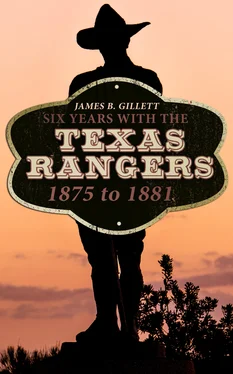James B. Gillett - Six Years With the Texas Rangers - 1875 to 1881
Здесь есть возможность читать онлайн «James B. Gillett - Six Years With the Texas Rangers - 1875 to 1881» — ознакомительный отрывок электронной книги совершенно бесплатно, а после прочтения отрывка купить полную версию. В некоторых случаях можно слушать аудио, скачать через торрент в формате fb2 и присутствует краткое содержание. Жанр: unrecognised, на английском языке. Описание произведения, (предисловие) а так же отзывы посетителей доступны на портале библиотеки ЛибКат.
- Название:Six Years With the Texas Rangers: 1875 to 1881
- Автор:
- Жанр:
- Год:неизвестен
- ISBN:нет данных
- Рейтинг книги:3 / 5. Голосов: 1
-
Избранное:Добавить в избранное
- Отзывы:
-
Ваша оценка:
- 60
- 1
- 2
- 3
- 4
- 5
Six Years With the Texas Rangers: 1875 to 1881: краткое содержание, описание и аннотация
Предлагаем к чтению аннотацию, описание, краткое содержание или предисловие (зависит от того, что написал сам автор книги «Six Years With the Texas Rangers: 1875 to 1881»). Если вы не нашли необходимую информацию о книге — напишите в комментариях, мы постараемся отыскать её.
Six Years With the Texas Rangers: 1875 to 1881 — читать онлайн ознакомительный отрывок
Ниже представлен текст книги, разбитый по страницам. Система сохранения места последней прочитанной страницы, позволяет с удобством читать онлайн бесплатно книгу «Six Years With the Texas Rangers: 1875 to 1881», без необходимости каждый раз заново искать на чём Вы остановились. Поставьте закладку, и сможете в любой момент перейти на страницу, на которой закончили чтение.
Интервал:
Закладка:
Though a ranger was forced to supply his own mount, the state undertook to pay for the animal if it were killed or lost in an Indian fight. To establish the impartial value of our animals, Captain Roberts marched us into Menardville and asked three citizens of the town to place a value on each man's mount. This was done, and I was highly gratified when old Coley, my mount, was appraised at $125. This formality over, the company was moved from Little Saline to Camp Los Moris, five miles southwest of Menardville, Texas. We were now ready to begin scouting for Indians.
As is usual under the same circumstances the new recruits came in for their share of pranks and mishaps. One raw rooky in my mess, fired with love of economy, undertook to cook ten days' rations for the whole mess at one time. He put a quantity of rice on the fire. Soon it began to boil and swell, and that surprised ranger found his rice increasing in unheard of proportions. He filled every cooking vessel in the mess with half-cooked rice, and still the kettle continued to overflow. In desperation he finally began to pour it on the ground. Even then he had enough rice cooked to supply the entire company.
Another recruit, anxious to test his new weapons, obtained Captain Roberts' permission to go hunting. He had not gone far from camp before he began firing at some squirrels. One of his bullets struck the limb of a tree and whizzed close to camp. This gave an old ranger an idea. He hastened after the hunter and gravely arrested him, declaring that the glancing bullet had struck a man in camp and that Captain Roberts had ordered the careless hunter's arrest. The veteran brought in a pale and badly scared recruit.
One of the favorite diversions of the old rangers was to make a newcomer believe that the state furnished the rangers with socks and start him off to the captain's tent to demand his share of free hosiery. The captain took these pranks in good part and assured the crestfallen applicant that the rangers were only playing a joke on him, while his tormentors enjoyed his discomfiture from a safe distance.
When they had run out of jokes the rangers settled down to the regular routine of camp. Each morning the orderly sergeant had roll call, at which time he always detailed six or eight men with a non-commissioned officer to take charge of the rangers' horses and the pack mules until relieved the following morning by a new guard. The guard was mounted and armed and drove the loose stock out to graze. The horses were never taken far from camp for fear of being attacked by Indians, and also to keep them near at hand in case they were needed quickly.
The rangers not on guard spent their time as they wished when not on duty, but no man could leave the camp without the captain's permission. The boys played such games as appealed to them, horseshoe pitching and cards being the favorite diversions. As long as it did not interfere with a man's duty as a ranger, Captain Roberts permitted pony racing, and some exciting contests took place between rival horse owners. And hunting and fishing were always available, for woods and streams were stocked with game and fish.
I soon had cause to congratulate myself on my enlistment in Company "D," for I found Captain D. W. Roberts the best of company commanders. At the time I joined his command he was just thirty-five years of age, very slender and perhaps a little over six feet tall. His beard and hair were dark auburn. He was always neatly dressed and was kind and affable in manner,—looking more like the dean of an Eastern college than the great captain he was.
Captain Roberts was a fine horseman and a good shot with both pistol and rifle. He was also a fine violinist and often played for the boys. He had been raised on the frontier and had such a great reputation as an Indian fighter that the Fourteenth Legislature of Texas presented him with a fine Winchester rifle for his gallantry in fighting the redskins. The captain had made a close study of the habits and actions of the Indians and had become such an authority that their life was an open book to him. This, of course, gave him a great advantage in following and fighting them, and under his able leadership Company "D" became famous. There was not a man in the company that did not consider it a compliment to be detailed on a scout with Captain Roberts.
In the latter part of the summer or early fall of 1875, Captain Roberts visited Colorado County, Texas, and returned with a bride, a Miss Lou Conway. Mrs. Roberts was a very refined and elegant lady, and soon adapted herself to the customs of the camp. She was with her husband on the San Saba River during the winter of 1875-76 and soon became as popular with the company as Captain Roberts himself.
Most people consider the life of the Texas Ranger hard and dangerous, but I never found it so. In the first place, the ranger was always with a body of well-armed men, more than a match for any enemy that might be met. Then, there was an element of danger about it that appealed to any red-blooded American. All of western Texas was a real frontier then, and for one who loved nature and God's own creation, it was a paradise on earth. The hills and valleys were teeming with deer and turkey, thousands of buffalo and antelope were on the plains, and the streams all over Texas were full of fish. Bee caves and bee trees abounded. In the spring time one could travel for hundreds of miles on a bed of flowers. Oh, how I wish I had the power to describe the wonderful country as I saw it then. How happy I am now in my old age that I am a native Texan and saw the grand frontier before it was marred by the hand of man.
The Lipans, Kickapoos, Comanches, and Kiowa Indians used to time their raids so as to reach the Texas settlements during the light of the moon so they would have moonlight nights in which to steal horses and make their getaway before they could be discovered. By morning, when their thefts became known, they would have a long lead ahead and be well out on their way into the plains and mountains. The captains of the ranger companies knew of this Indian habit, and accordingly kept scouts constantly in the field during the period of the raids. The redskins coming in from the plains where water was scarce generally took the near cut to the headwaters of the Colorado, Concho, San Saba, Llanos, Guadalupe, and Nueces Rivers. By maintaining scouts at or near the heads of these streams the rangers frequently caught parties of Indians going in or coming out from the settlements, and destroyed them or recaptured the stolen stock.
The first light moon in June Captain Roberts ordered a detail of fifteen men in command of Sergeant James B. Hawkins to make a ten days' scout toward the head waters of the North Llano River. He was to select a secluded spot near old abandoned Fort Territ and make camp there. Each morning a scout of one or two men would be sent out ten or fifteen miles south and another party a like distance toward the north to hunt for Indian trails. The main body of rangers, keeping carefully concealed, was in readiness to take up an Indian trail at a moment's notice should one be found by the scouts.
One morning Sergeant Hawkins ordered me to travel south from camp to the head draws of the South Llano and watch for pony tracks.
"Suppose the Indians get me?" I asked laughingly as I mounted my pony.
"It's your business to keep a sharp lookout and not let them catch you," he replied.
However, though I watched very carefully I could find no pony tracks or Indian trails.
We had with us on this scout Mike Lynch, a pure Irishman. Though he was old and gray-headed, he was a good ranger, and had much native wit. One morning it was Uncle Mike's turn to go on scout duty, but in a few hours he was seen coming into camp with his horse, Possum, on the jump. He reported a fresh Indian trail about ten miles north of our camp. When asked how many pony tracks he had counted, Lynch at once declared he had counted seventeen and thought there were more. As the Indians usually came in on foot or with as few ponies as they could get by on until they could steal others, Sergeant Hawkins suspected the tracks Lynch had seen were those of mustangs. The excited scout declared vehemently that the tracks were not those of wild horses but of Indians. The sergeant was just as positive that no Indian party was responsible for the trail, and the two had quite a heated argument over the tracks.
Читать дальшеИнтервал:
Закладка:
Похожие книги на «Six Years With the Texas Rangers: 1875 to 1881»
Представляем Вашему вниманию похожие книги на «Six Years With the Texas Rangers: 1875 to 1881» списком для выбора. Мы отобрали схожую по названию и смыслу литературу в надежде предоставить читателям больше вариантов отыскать новые, интересные, ещё непрочитанные произведения.
Обсуждение, отзывы о книге «Six Years With the Texas Rangers: 1875 to 1881» и просто собственные мнения читателей. Оставьте ваши комментарии, напишите, что Вы думаете о произведении, его смысле или главных героях. Укажите что конкретно понравилось, а что нет, и почему Вы так считаете.












